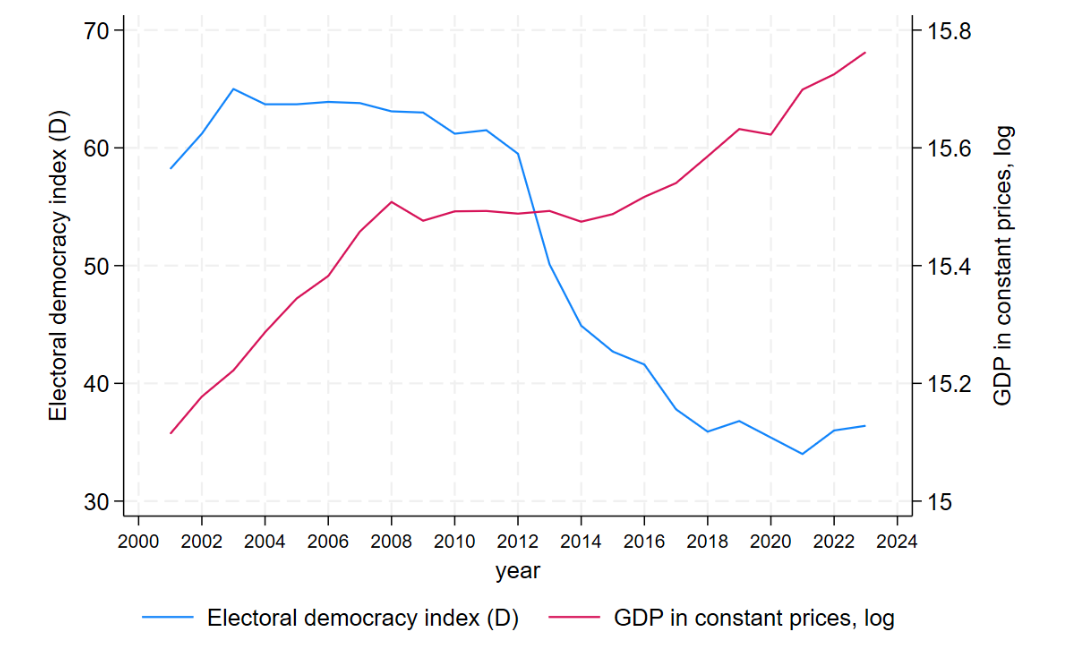The Nobel Prize for Institutions: A critique of Acemoglu and Robinson’s framework

On the same day the Nobel Committee announced its decision to award the 2024 Nobel Prize in Economics to Daron Acemoglu, Simon Johnson, and James A Robinson for their work on institutions and prosperity, I found myself critiquing their explanatory framework in the context of my new project on public administration in Serbia. Their argument, primarily from Why Nations Fail (2012), posits that long-term growth depends on the presence of inclusive political and economic institutions — those that promote democratic participation and fair economic practices. But how does this theory hold up in Serbia’s case?
If we look at GDP growth as an indicator of Serbia’s governance capacity to foster economic development, the trend reveals some contradictions. GDP growth peaked around 2008, plateaued for about seven years, and then accelerated around 2015 — coinciding with the rise of the Serbian Progressive Party (SNS)-led government. According to the ruling coalition, this resurgence vindicates their superior governance compared to prior administrations.
Interestingly, however, Serbia’s Electoral Democracy Index (EDI) and GDP growth ran in parallel until about 2012, after which they diverged. While Serbia’s democratic standards eroded, economic growth continued to climb, suggesting that prosperity has become increasingly decoupled from democratic governance.

This observation raises a fundamental question: How well does Serbia’s recent economic performance fit into the Acemoglu-Robinson framework?
The Acemoglu-Robinson framework: A brief overview
Acemoglu and Robinson’s Nobel-winning research focuses on the relationship between institutions and prosperity. In their view, inclusive institutions — those that allow broad participation, respect for the rule of law, and constrain the power of elites — are essential for long-term economic growth. By contrast, extractive institutions, controlled by elites with no democratic accountability, suppress broad economic participation, leading to stagnation and eventual decline.
Their theory, most famously articulated in Why Nations Fail, posits that inclusive institutions were historically essential for the development of Western economies. They argue that without such institutions, permanent innovation and sustainable growth are impossible, as elites in extractive systems tend to block any development that threatens their power.
The distinction between inclusive and extractive institutions is central to their explanation for why some countries are rich while others remain poor. In their view, countries that embrace inclusive, liberal democratic institutions experience prosperity, while those ruled by rent-seeking elites suffer under extractive institutions.
Critique: The Serbian exception and beyond
However, Serbia presents a challenge to this framework. Despite deteriorating democratic standards and increasing centralisation of power under the SNS, Serbia has experienced sustained GDP growth. This divergence suggests that economic performance in Serbia is not contingent on the type of inclusive institutions Acemoglu and Robinson champion.
Critics have noted similar discrepancies elsewhere. De Vries, for instance, argues that the connection between democracy and economic growth is far more complex than Acemoglu and Robinson suggest. He points out that democracies were exceedingly rare during the economic take-off of most countries, and there is no clear evidence that democratic governance is necessary for growth — rather, the contrary seems to be true in some cases. Furthermore, democracy does not guarantee sustained growth once take-off has been achieved.
This is not an isolated critique. Scholars like Branko Milanovic have been particularly critical of Acemoglu and Robinson’s framework, which Milanovic called “Wikipedia with regressions.” He emphasises a striking and non-accidental omission in Acemoglu and Robinson’s work, a total absence of Communism, which is obviously a set of complex institutions. This is because the functioning of institutions under Communism cannot be explained within their framework. Communism had bad institutions, but they were not put there to serve an "extractive minority".
In Capitalism, Alone, Milanovic points to the economic success of China and Vietnam, which do not possess the “inclusive” institutions described by Acemoglu and Robinson, yet have achieved some of the highest growth rates in the world. In Why Nations Fail, Acemoglu and Robinson dismiss the successes of China and Vietnam as temporary, predicting that their growth will falter as their extractive institutions catch up with them. This prediction, however, remains unfulfilled even as China approaches the status of a global economic superpower.
Michael Roberts, critiquing from a Marxist perspective, highlights the limitations of Acemoglu and Robinson’s framework. He questions how they explain the economic performance of states such as the Soviet Union and China if these regimes are labelled as extractive. Roberts notes that their model oversimplifies the complex relationship between political structures and economic growth, ignoring the role of state-driven development under socialist systems. Moreover, he points out that AJR’s examples — like Britain’s 19th-century democratisation or United States independence — fail to account for the broader economic forces, including the expansion of capitalism, trade, and colonisation, that drove growth.
A broader Marxist critique
In many ways, Acemoglu and Robinson’s framework echoes the “end of history” thesis popularised by Francis Fukuyama, which proclaims Western-style neoliberal democracy as the pinnacle of political and economic development. Their theory essentially reduces the pathway to prosperity to adopting Western liberal institutions, ignoring the historical role capitalism has played in perpetuating unequal development. As Baran and Sweezy argued, capitalism in the Global South is structurally constrained by its relationship with the Global North, which continues to extract surplus value from developing economies.
My research (with Boris Kagarlitsky) on foreign direct investment (FDI) in the Global South shows how surplus value is extracted from the periphery by these same liberal democratic institutions in the centre that Acemoglu and Robinson consider the pinnacle of institutional development. In the case of Serbia, economic growth under a regime that does not fit the definition of “inclusive” challenges the simplistic binary of inclusive versus extractive institutions. Serbia's growth underscores the ways in which global inequality, driven by the same capitalist mechanisms that Acemoglu and Robinson overlook, continues to funnel surplus from the periphery to the centre.
Acemoglu, Johnson and Robinson built their framework on the foundation of institutional economics, drawing heavily from Douglass North. However, while North and his followers provided valuable insights, their approach was often too general, too value-neutral, and focused primarily on the transaction costs of institutions. In the 1990s, as post-Communist “end of history” euphoria took hold across Western intellectual fields — from philosophy to history and political science — there was a growing social demand for more ideological clarity. This demand spread to economics as well, which led to a search for a framework that went beyond North’s value-neutral analysis. Acemoglu, Johnson and Robinson responded to this demand by developing a more ideologically-oriented model that positioned liberal democratic institutions as the pinnacle of development.
This limited view of democracy has significant consequences, especially for the left. Kagarlitsky warns in his most recent book: “But if our concepts of democracy and freedom are limited by the horizon of liberal political institutions, then we, members of the left, risk losing both our social rights and our political freedoms.” This critique underscores the danger of accepting narrow definitions of democracy that align solely with liberal capitalism, thereby sidelining more radical or socialist alternatives.
In my view, Acemoglu and Robinson’s framework is a product of the neoliberal shift that occurred in the West in the 1970s and ’80s, a period marked by the collapse of the Socialist Bloc. Following the intellectual tradition described by Thomas Kuhn in The Structure of Scientific Revolutions, Acemoglu and Robinson’s work can be seen as the culmination of a paradigm in institutional economics.
Their framework has cemented itself as part of the dominant discourse in economics, shaping how scholars and policymakers understand development within the liberal capitalist order. Their work provides an ideological justification for the expansion of Western liberal capitalism as the only path to prosperity. However, just as Kuhn argued that paradigms eventually give way to new, more accurate frameworks, the limitations of Acemoglu and Robinson’s theory indicate that the field may soon be ripe for such a paradigm shift.
Conclusion
Marx once said, “theory also becomes a material force as soon as it has gripped the masses.” The strength of Acemoglu and Robinson’s work lies not in its empirical accuracy but in its alignment with the political and economic demands of its time. Their theory of institutional development, though flawed, has become a standard reference point in discussions on economic growth and governance. Acemoglu, Jackson and Robinson have made a notable contribution to firmly establishing institutions as an important part of mainstream economics and economic analysis. That their approach was ideologically consistent with the ruling ideals of liberal democracy did help to overcome the widespread long-entrenched hesitance and suspicion of institutions in economic science, which often viewed institutional analysis as smacking of Marxism despite the pioneering breakthroughs of North and Elinor Ostrom (both of whom were previously awarded Nobel prizes).
While I largely disagree with their conclusions, I included their work in the literature review for my new project on Serbia’s public administration. Their framework, however incomplete, has shaped the debate on institutions and development in a way that cannot be ignored. Despite the evidence to the contrary, their theory continues to hold sway — much like the liberal capitalist order they champion. Pointing to the ideological orientation of the prize, Juan Torres argues Nobel prize awards in economics are inherently partial and ideological, by an institution at the service of the dominant power that has the world in a situation of great instability and risk in which it finds itself.
When analysts like Michael Roberts suggest that Acemoglu and Robinson have recently produced better and more relevant work, it reflects, in a way, the decline in the power of liberal bourgeois institutional economics. This raises the question: does the prize still reflect contemporary reality, or is it a step behind? Had the Nobel Prize been awarded to them a few years earlier, the reaction could have been more enthusiastic. But the mixed reaction within the economic profession now is a promising sign. It suggests that the field has outgrown the restrictive paradigm completed by Acemoglu and Robinson and is actively searching for new, better answers to the challenges of development in today's world.